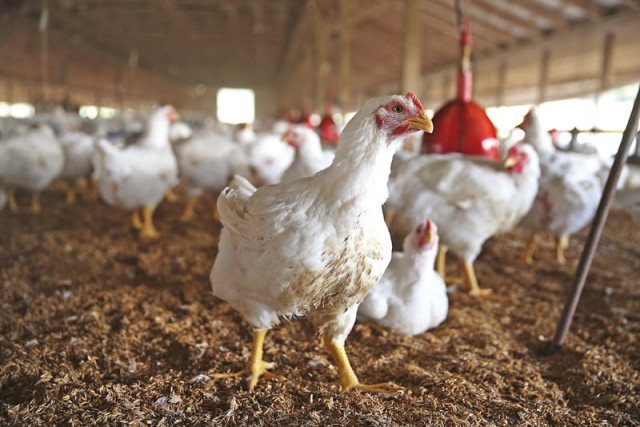Poultry disease: New vaccine to save birds, avert loss of billions
Can bear high temperature while imported ones need cool chain.

It is the first of its kind vaccine produced through cell culture that can bear temperatures of up to 26 degrees Celsius compared to imported vaccines that cannot tolerate temperatures above 8 degrees Celsius and are supposed to be kept in a cool chain right from the port to its ultimate usage.

The new vaccine is comparatively cheaper than the imported ones and will help save billions of rupees annually in the import of vaccine and provision of cold storage facilities.
The Newcastle disease, also called Ranikhet, the name of an Indian town where the disease was first detected, has badly hurt the poultry sector as thousands of birds have died because of the virus, say poultry farmers while talking to The Express Tribune.
The mortality rate of birds has shot up to 20% and above and in some cases farmers have lost their entire stock of birds, they say.
A leading poultry farmer, Dr Sajjad Randhawa, told The Express Tribune that the vaccine developed by the UAF scientists was more effective in protecting the chicks from the disease.
He pointed out that poultry was becoming the second largest and fastest-growing industry in Pakistan but unfortunately it had faced serious challenges like the Newcastle disease in recent years.
He suggested that the government should offer incentives to shield the industry from crippling losses.

UAF Vice Chancellor Dr Iqrar Ahmad Khan said poultry, after cotton, had emerged as the second largest industry, employing millions of people with around one billion birds across the country.
The new vaccine, named ThermoVac, had a longer shelf life in normal temperatures and would not only help save billions of rupees but also increase productivity and profit of farmers, he said.
At present, Pakistan imports 90% of vaccines for animal diseases and produces only 10% of the needs.
As part of another project funded by the Pakistan Agricultural Research Board (PARB), UAF has identified 10 new varieties of mango.
PARB Chief Executive Dr Noorul Islam, while praising UAF’s role, suggested that researchers should come up with solutions for the industry and address the issues faced by the people.
He stressed that the new vaccine was the need of the hour and was an outcome of applied research and product development that would address woes of poultry farmers.
He said PARB was making efforts to promote demand-driven applied research activities and offered the board’s cooperation in running the second phase of the vaccine development project to advance research work.
Faculty of Veterinary Sciences Dean Professor Dr Zafar Iqbal Randhawa said poultry’s contribution to agriculture and livestock was 6.4% and 11.5% respectively and had a 28.5% share in meat production. His faculty is taking measures to ensure better-quality education and research.
Institute of Microbiology Director Dr Iftikhar Hussain said the Newcastle disease was a major threat to poultry while imported vaccines were liable to heat and needed a constant cold chain, resulting in a high cost and limited efficacy.
“The vaccine developed by UAF is much compatible to our climate that can bear temperatures of up to 26 degrees Celsius.”
The vaccine is the outcome of a PARB-funded project titled “Preparation and Field Evaluation of Thermostable Newcastle Disease Vaccine”, carried out by Dr Shahid Mahmood, Dr Iftikhar Hussain and Dr Faisal Sadiq.
Published in The Express Tribune, December 20th, 2014.
Like Business on Facebook, follow @TribuneBiz on Twitter to stay informed and join in the conversation.


















COMMENTS
Comments are moderated and generally will be posted if they are on-topic and not abusive.
For more information, please see our Comments FAQ